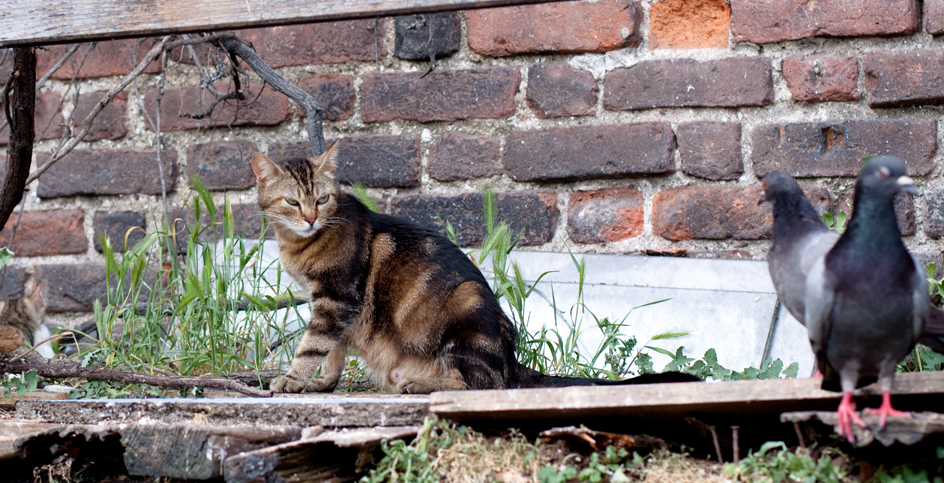- bond
Conversations between cats and pigeons

Excitement
A pigeon lands on the windowsill and the cat, which was placidly lying down behind the window, suddenly becomes tense. It stares at the pigeon, while the nervous flick of its tail reveals its excitement. Without losing sight of it even for a moment, the cat starts making a peculiar sound. It is like a chirping, a sequence of little squeals emitted while cat's teeth are chattering. Either the cat stays still or it starts approaching the pigeon slowly, keeping its body against the floor. This is quite a bizarre situation, where the cat seems to be stalking the pigeon while at the same time it is warning its prey that it is being stalked. This seems to be a contradiction, ¿so why does the cat emit that sound?
Vocalisation
Cats make chirping or chattering noises when they detect barriers, such as a window, that prevent them from hunting their prey. Then cats get excited and at the same time frustrated, and they start moving their jaw as if they had the pigeon in their mouth. When cats catch their prey, they bite their collar with great precision, producing an instantaneous death. In this case, the sound made by the cat when stalking the pigeon could be a theatrical representation of that bite produced by the frustration of not being able to catch its prey.
Theories
Experts believe that this vocalisation is an example of "vacuum activity or behaviour", that is to say, actions that are performed in the absence of the external stimuli that would normally elicit them, or, in this case, the pigeon in the cat's mouth. However, there is another fascinating theory about the meaning of this type of vocalisation in cats. This second theory was elaborated as a result of a study performed on Tamarins in the Amazon rainforest. Researchers observed how the Margays, a species of wild feline, imitated some of the vocalisations of monkeys in order to be able to approach them and subsequently catch them. Experts have also observed that cougars and jaguars imitate the sound of their prey too,… hence the as-yet-unconfirmed suspicion that cats “that "talk"” with pigeons are really trying to imitate their potential prey in order to get closer and catch them!
Instincts
Whether it is by frustration or by imitation of the sounds of their prey, the “conversation” between a cat and a pigeon reveals that even the most calm and homey cats keep their hunting instincts alive and one single pigeon is enough to trigger it in one second.


